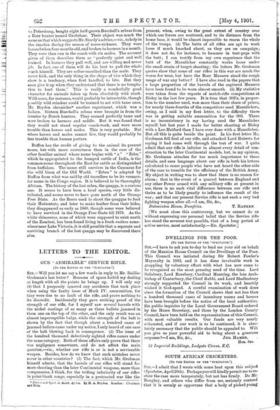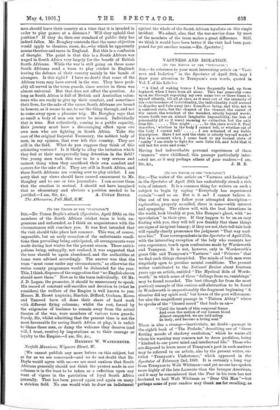SOUTH AFRICAN CRICKETERS. [TO THE EDITOR OF THE "SPECTATOR. "] SIR,
I admit that I wrote with some heat upon this subject (Spectator, April 20th). Perhaps you will kindly permit me to re- state the case more temperately, but not less firmly. Do Mr.- Boughey, and others who differ from me, seriously contend that it is seemly or opportune that a body of picked young.
men should leave their country at a time that it is invaded in order to play games at a distance ? Will they uphold that position ? If they do, then our standard of public duty has indeed fallen. Mr. Boughey contends that the same objection would apply to theatres, races, &c.,—by which he apparently means theatres and races in England. But this is a confusion of thought. The point is that this is a South African war waged in South Africa very largely for the benefit of British South Africans. While the war is still going on these same South Africans send a team to play cricket in England, leaving the defence of their country mainly in the hands of strangers. Is this right? I have no doubt that some of the African team may have served in the war. They have prob- ably all served in the town guards, since service in them was almost universal. But that does not affect the question. As long as South Africa is full of British and Australian volun- teers who are ready to give up their comfort, and sometimes their lives, for the sake of the cause, South Africans are bound in honour, as it seems to me, to see the thing through, and not to come away upon a pleasure trip. Mr. Boughey says that so small a body of men can never be missed. Individually that is true. But collectively, coming in a public capacity, their journey must have a discouraging effect upon our own men who are fighting in South Africa. Take the case of the original Imperial Yeomanry, the noblest body of men, in my opinion, that ever left this country. They are still in the field. What do you suppose they think of this cricketing venture ? Is it likely to allay the irritation which they feel at their unexpectedly long detention in the field ? Our young men took this war to be a very serious and earnest thing when they sacrificed their own comfort and careers for the sake of it. They are still in South Africa, and these South Africans are coming over to play cricket. I am sorry that my views should have caused amazement to Mr. Boughey and to one or two journalists. I can assure them that the emotion is mutual. I should not have imagined that so elementary and obvious a position needed to be
justified.—I am, Sir, &c., A. CONAN DOYLE. The Athena-um, Pall Mall, S.W.











































 Previous page
Previous page